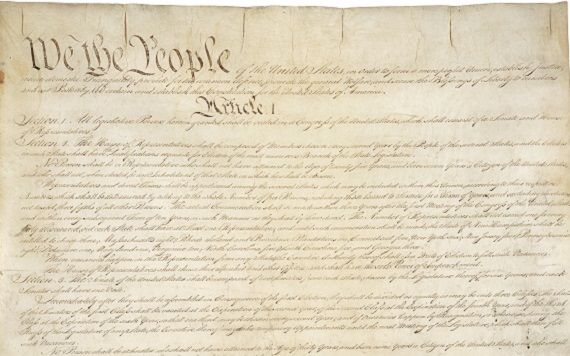
A decisive moment is coming for the peoples of the States, especially for those who consider themselves conservatives yet belong to the cult of Lincoln: Will the Electoral College system for selecting the federal president continue on, or will it be scrapped for a purely national vote?
At the State and federal level, attempts to change it are ongoing:
Calls to abolish the Electoral College are gaining more traction among the 2020 Democratic presidential candidates, with Sen. Elizabeth Warren becoming the latest high-profile backer of the electoral reform.
During a CNN town hall in Jackson, Miss., on Monday night, the Massachusetts Democrat threw her support behind eliminating the Electoral College when discussing how to expand voting rights.
“Come a general election, presidential candidates don’t come to places like Mississippi, they also don’t come to places like California or Massachusetts, because we’re not the battleground states,” Warren said at the town hall.
“My view is that every vote matters, and the way we can make that happen is that we can have national voting, and that means get rid of the Electoral College,” she said to a standing ovation.
The debate over the Electoral College has gained prominence in the wake of the 2016 presidential election, in which Donald Trump defeated Hillary Clinton, despite the former secretary of state winning the popular vote by nearly three million votes.
There’s a state-level effort burgeoning that seeks to dilute the power of the Electoral College. Colorado is the latest state to join a compact with 11 other states and the District of Columbia in which they pledge their electoral votes to the winner of the national popular vote.
And yet, what hangs in the balance is more than just a method of election. It is an understanding of where the locus of authority rests: at the State level or at the federal level. To be consistent in supporting the Electoral College, its defenders must acknowledge the principle of State sovereignty that underlies it. If, however, they insist on loyalty to Pres Lincoln’s view of the union, that the united States are ‘one nation indivisible’ rather than 50 unique, individual nations that can voluntarily leave a union they voluntarily joined, then the Electoral College MUST be replaced with a national voting system. The States in the latter view are superfluous at best and hindrances at worst to the proper expression of the divine ‘national will’ in Washington City.
The Electoral College will therefore stand or fall mainly on the grounds of State sovereignty. But defenders of the current system who follow the contradictory doctrines of the pro-Lincoln conservatives will try to save it instead with arguments based on utility: It’s more fair to people in ‘flyover country’; there is less chance of cheating in a decentralized presidential election system; etc. See, e.g.,
But arguments of utility will not withstand the withering blast of the passions of the masses who are determined to gain thus and such abstract right they feel they are entitled to. Already a plurality (46-41) support replacing the Electoral College (if polls are to be believed).
When the media propaganda machine kicks into high gear, what will the results be? And the power of that propaganda is greater than ever thanks to the research and practices of the Big Tech/social media giants:
Increasing concentration of power within Silicon Valley undermines free markets and human freedom, remarked [Louisiana Attorney General Jeff] Landry.
“When you look at the amount of data, the amount of processing power that these companies have at their disposal, they know more about you than you know about yourself,” said Landry. “We’ve seen them make comments like, ‘We can basically bend the consumer in the direction we want him to go rather than what he wants.’ That’s not independence. That’s not liberty. That’s not a free market.”
And if the Electoral College goes, so too will the Senate.
Utility is not enough. Arguments must be made from principle and other solid realities. Only this will be strong enough to withstand the floodtide of misguided passions until they subside. For principle, truth, long-standing customs and institutions are what is real; the passions are fed by the abstract, by theories, that which is false and unreal. The latter will fall to pieces eventually; but the former will endure. Thus, we must counter the mental construct of the Hobbesian sandbox of sovereign individuals with the reality of the sovereign States; abstract propositions like ‘one man, one vote’ (even for knot-headed teenagers) with the ancient unwritten constitution, with political power vested in landowners and the patriarchs of families (simply an upper age limit for the franchise of 40 or 50 may do wonders at this point); the social contract with organic communities historically and ontologically rooted in a particular culture.
Andrew Lytle saw one of the weaknesses of the South in her being too caught up in fighting defensive battles rather than going on the offense. In addition to the above, as it regards the Electoral College in particular, there needs to be a counter-proposal to the national popular vote. One idea that we would offer is to allow the governors of the States to elect the federal president. This seems beneficial for a few reasons:
First, it would simplify the election process (no more voting for slates of electors whom no one has ever heard of) and reinforce the idea of the equality of the States in the union by granting each State one vote for the president.
Second, it would give the States a greater measure of power over the federal government.
Third, it would put an end to the silly melodrama that presidential elections have become thanks to talk radio, cable news, etc. We do not need an entire ‘season’ dedicated to the selection of the federal president, as though this were somehow as important as the Christmas season or the growing season for crops.
A decisive moment is what the ancient Greeks referred to as a crisis (κρίσις), and though it can be a time of great peril, it can also be a time of great opportunity. Thus, for the South, this debate over the Electoral College is an opportunity to take a few steps back towards healthy traditions. And didn’t Rahm Emanuel teach us to never let a good crisis go to waste? We dare not gainsay the wisdom of a Yankee.






